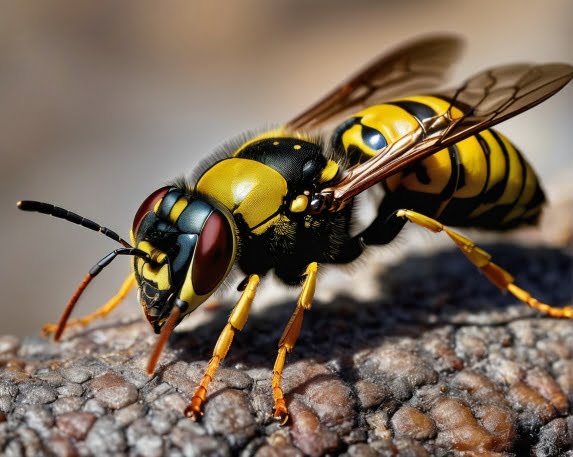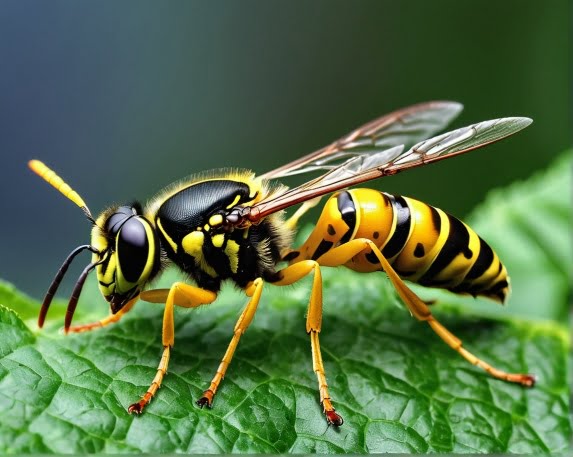Dealing with Wasp Stings: A Guide for Allergy Sufferers
Panther Pest Control Blog -Dealing with Wasp Stings
Keep your home pest-free with Panther Pest Control:
- Expert pest control services for homes and businesses.
- Safe, effective, and environmentally-friendly treatments.
- Trusted professionals dedicated to eliminating pests for good.
Find pest controller near you
A Guide for Allergy Sufferers



Wasps are one of nature’s most formidable insects. While many people experience mild discomfort from a wasp sting, for those who are allergic, the situation can quickly escalate into a life-threatening emergency. Understanding how to respond to a wasp sting if you or someone nearby is allergic is crucial. This blog post will guide you through the steps to take before, during, and after a wasp sting, particularly if you’re dealing with an allergic reaction.
Understanding Wasp Stings and Allergic Reactions
Wasps can sting multiple times, injecting venom into their victims. For most, this results in a sharp pain, redness, and swelling around the sting site. However, for individuals allergic to wasp venom, the sting can trigger an anaphylactic reaction, a severe and potentially fatal response.
An allergic reaction to a wasp sting typically occurs within minutes. Symptoms may include:
- Hives or rash: These may appear on areas of the body not near the sting.
- Swelling of the face, lips, throat, or tongue: This can lead to difficulty breathing.
- Shortness of breath or wheezing: This is a serious symptom indicating respiratory distress.
- Dizziness or fainting: A drop in blood pressure can cause a person to feel lightheaded or faint.
- Rapid or weak pulse: The heart may beat faster as the body responds to the venom.
- Nausea, vomiting, or diarrhea: These are common symptoms of anaphylaxis.
If you suspect an allergic reaction, immediate action is necessary.
What to Do Immediately After a Wasp Sting
1. Assess the Situation
The first step is to remain calm and assess the severity of the sting. For a mild reaction, treat the sting with basic first aid measures:
- Remove the stinger: Wasps don’t leave their stingers behind like bees, so this step might not be necessary, but it’s good to check.
- Wash the area: Clean the sting site with soap and water to remove any venom or bacteria.
- Apply a cold compress: This helps reduce swelling and numbs the pain.
- Take an antihistamine: Over-the-counter antihistamines can reduce itching and swelling.
2. Recognize an Allergic Reaction
If the person stung shows signs of a severe allergic reaction (anaphylaxis), call emergency services immediately.
3. Use an Epinephrine Auto-Injector
If the individual carries an epinephrine auto-injector (commonly known as an EpiPen), administer it immediately. Epinephrine can reverse the symptoms of anaphylaxis quickly. The injection is usually given in the thigh and can be administered through clothing if necessary.



After Using the EpiPen
Even after administering epinephrine, emergency medical services should be called. The effects of the epinephrine may wear off, and additional medical treatment may be required. While waiting for medical help:
- Keep the person calm and lying down: Elevate their legs to help maintain blood flow to vital organs.
- Loosen tight clothing: This can help ease breathing if the person is having difficulty.
- Monitor breathing and pulse: Be prepared to perform CPR if the person loses consciousness and stops breathing.
Preventing Wasp Stings
For those allergic to wasp stings, prevention is key. Here are some strategies to avoid being stung:
- Avoid bright colors and floral patterns: Wasps are attracted to these, thinking they’re flowers.
- Use unscented products: Perfumes, lotions, and hair sprays can attract wasps.
- Be cautious around food: Wasps are attracted to food and sugary drinks. Cover food and drinks when outside.
- Wear shoes outdoors: Going barefoot increases the risk of stepping on a wasp.
- Keep garbage sealed: Wasps are often found near trash cans, so keep them tightly closed.
When to Seek Professional Help
If you frequently encounter wasps around your home or garden, it might be time to consider professional help. A wasp nest near your home is a significant risk, especially if someone in your household is allergic.
Panther Pest Control offers expert wasp control services to safely and effectively remove wasp nests from your property. With professionals trained to handle these situations, you can avoid the dangers of wasp stings altogether. Don’t take chances with wasp infestations—reach out to the experts at Panther Pest Control.
Visit our Wasp Control Services page for more information and to schedule an inspection today.
A wasp sting can be more than just a painful inconvenience, especially for those who are allergic. Knowing how to react quickly and effectively can save lives. Always be prepared, understand the risks, and take proactive steps to prevent stings. And remember, when dealing with wasps, professional pest control services like those offered by Panther Pest Control can provide peace of mind and ensure your environment is safe from these potentially dangerous insects.

Leave a Reply